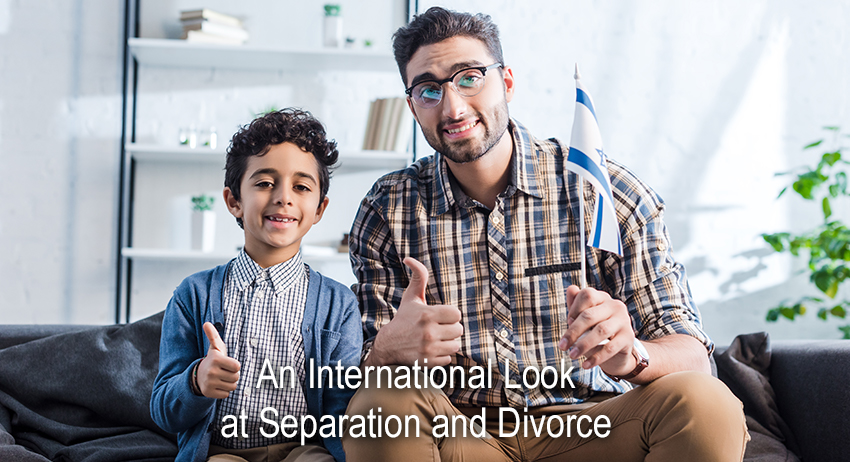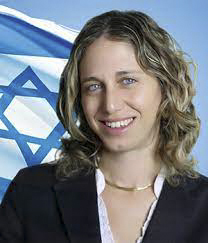



Whatever country you may live in, it is a universal truth that parental separation or divorce are an emotionally traumatic event for the children involved and can have far-reaching effects not just on their mental health but on their physical health as well. As more evidence becomes available to support this claim and global education around Adverse Childhood Experiences (ACEs) increases, efforts to mitigate the trauma caused by conflict and separation are multiplying around the world.

One example of how countries can learn from one another and support the various efforts of individuals and institutions is in the collaborative relationship Kids First has fostered with Maia Morag, an Israeli fellowship student with the Mandel Global Leadership and Learning Pathways program, which has a Center in Cleveland as well as Jerusalem. This program looks at the current and future healthcare issues of the world, one of which is the deteriorating mental health of our youth, and cultivates high-potential leaders through innovative leadership education to prepare them to solve these challenges globally.
Maia is part of a group of about twenty students from Jewish, Arab, Orthodox, and secular backgrounds all coming together from educational management backgrounds. They are given two years to explore, learn and research themes in healthcare that are important to them so they can make real change in the educational system of Israel when they return to the field.
Living and working in Jerusalem, Maia first reached out to Kids First when researching the impact of separation and divorce on children and wanting to learn more about direct and indirect interventions to reduce its negative effects through support groups for kids and co-parenting education for their parents. She and the Executive Director of Kids First, Tim Robbins, developed an ongoing friendly correspondence discussing co-parenting strategies and interventions.
When Kids First board member Steve Young recently traveled in Israel, he met with Maia at the Institute to further discuss her research and the lack of collaboration on divorce and mental health issues between the legal system, the mental health system, educators and parents. Maia is specifically focused on research around how the schools may or may not be identifying and helping children whose parents are separated or divorced. She has made inroads with a pilot program delivering direct service support groups for kids within the schools.
Maia's parents divorced while she was a child and she is now married to a man who also grew up with divorced parents. She knows first-hand how children experience divorce and how they struggle with the family changes.
The challenges faced in Israel around co-parenting and support for children is complex. Though their statistics for legal separation and divorce are not too far behind the U.S., discussing the subject of separation and divorce as a society, acknowledging its fallout and creating support programming around it remains unpopular. Maia says, “what I’m trying to do in the schools is to change the way divorce is treated. I want to get schools to acknowledge that kids are suffering, that they are at risk. Look at them, talk to them, find out their situation because all of the statistics show us that they are at risk.” Maia quotes, “60 – 80% of Israel’s children who are at risk are children whose parents are separated or divorced.” She described her modality to Steve Young as a “mama bear mode, which you need to have in working with these systems and the parents. Not aggressive, but a ‘no-nonsense’ approach that shows that this is important, we NEED to do this!”
Marriage and divorce in Israel have a complicated history. In short, in order to be legally recognized, marriages and divorces are all mandated by the fifteen religious authorities, with the Rabbinate being the largest. Though there are other avenues to wed if a secular ceremony is preferred, including marrying abroad (as same-sex couples are required to do) and then registering with the Ministry of Internal Affairs upon returning home, Israel does not recognize civil marriages. However the marriage came to be, all divorces must be finalized through the Rabbinical courts. In this patriarchal system, no divorce can be complete until the woman receives a “get” from her husband, which he presents to her with the declaration, “You are hereby permitted to all men.” The effect of the "get" is to free the woman from the marriage, and consequently she is free to marry another and the laws of adultery no longer apply. The “get” also returns to the wife the legal rights that a husband held in regard to her. This system creates an imbalance of power that disadvantages the wife in any bargaining capacity, for fear of not receiving the “get” from her husband in retaliation.
Maia states that the process for filing for divorce also creates an adversarial situation between parents because, though the official, final divorce must come from the rabbinate, one can originally file with either the Rabbinical court or the civil court to handle the issues of custody, property, money, etc. Women typically want to file with the civil court, as they recognize their chances for more equitable treatment in that setting, so it becomes a race to file first.
Israel offers more intervention leading up to the final decision to divorce than it does for the aftermath. There are laws around the filing process, and when filing a Reconciliation claim, a couple agrees to a mandated waiting period meant to bring bridging and healing to the couple’s relationship and attempts are made to salvage the marriage, if possible. If the divorce moves ahead and is finalized, there are few resources other than private counseling for parents or children. Counseling can help parents and children through the inevitable ups and downs that lie ahead, while preventing the unintended consequences that result from post-divorce conflict and lack of co-parenting education and support.
Maia hopes to continue her collaboration with Kids First and learn more about our specific co-parenting education programs. Additionally, she is pursuing training through Rainbows for All Children, a nonprofit based in Chicago, that trains adult volunteers to lead age-specific support groups for children and teens who are grieving from some type of loss. Her commitment to making positive, systemic changes for Israeli children whose parents are separated or divorced is met with drive and determination, and Kids First is happy to support her efforts in any way that they can.